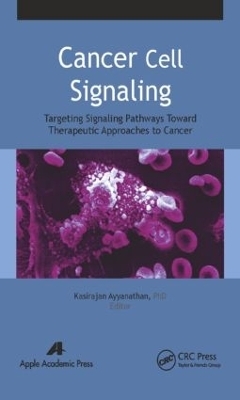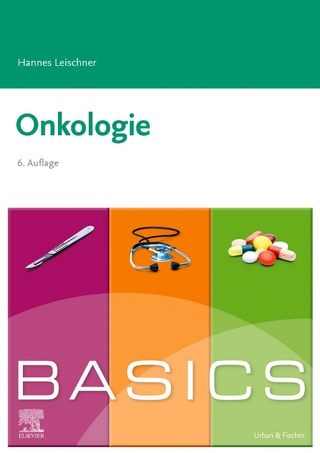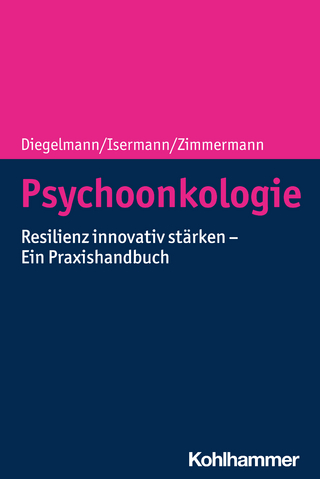
Cancer Cell Signaling
Apple Academic Press Inc. (Verlag)
978-1-77188-067-1 (ISBN)
Cell signaling is a field that studies how cells communicate to control basic activities and respond to their environment. When looking specifically at cancer cells, researchers can gain a better understanding of cancer on a cellular level, an understanding that may have implications for developing new treatments. The current volume provides an overview of the field and how various cell biology techniques are used to better understand cancer on a cellular level.Edited by a researcher from Florida Atlantic University, this easily accessible reference volume offers a comprehensive look at the field of cancer cell signaling.
Kasirajan Ayyanathan, PhD, received his PhD from the Department of Biochemistry, Indian Institute of Science, one of the premier research institutions in India. Subsequently, at Temple University School of Medicine, Philadelphia, Pennsylvania, USA, he conducted post-doctoral research on the signal transduction by purinergic receptors, a class of G-Protein Coupled Receptors (GPCR), in erythroleukemia cancer cells. Next, he was trained as a staff scientist at the Wistar Institute, Philadelphia, for almost ten years and studied transcription regulation, chromatin, and epigenetic regulatory mechanisms in cancer before becoming an associate professor at Florida Atlantic University (FAU). Currently, he is at the Center for Molecular Biology and Biotechnology as a research associate professor at FAU. He is the recipient of Chern Memorial Award, presented by the Wistar Institute, and Howard Temin Career Research Award, presented by the National Cancer Institute, USA.Dr. Ayyanathan is well trained in molecular biology, cell biology, and biochemistry with main focus on studying transcription factors and gene regulation. He has contributed to several projects such as on the generation of conditional transcriptional repressors that are directed against the endogenous oncogenes to inhibit malignant growth, on the establishment of stable cell lines that express chromatin integrated transcriptional repressors and reporter genes in order to study the epigenetic mechanisms of KRAB repression, and on identification of novel SNAG repression domain interacting proteins in order to understand their roles in transcriptional repression and oncogenesis. Dr. Ayyanathan has published several research articles in peer-reviewed articles in these subject areas.
This title includes a number of Open Access chapters.
Introduction. TGFβ-Mediated Suppression of CD248 in Non-Cancer Cells Via Canonical SMAD-Dependent Signaling Pathways Is Uncoupled in Cancer Cells. Graded Inhibition of Oncogenic Ras-signaling by Multivalent Ras-Binding Domains. Direct Inhibition of PI3K in Combination with Dual HER2 Inhibitors Is Required for Optimal Antitumor Activity in HER2+ Breast Cancer Cells. Wnt3a Expression Is Associated with MMP-9 Expression in Primary Tumor and Metastatic Site in Recurrent or Stage IV Colorectal Cancer. Wnt5a Promotes Migration of Human Osteosarcoma Cells by Triggering a Phosphatidylinositol-3 Kinase/Akt Signals. FOXA1 Promotes Tumor Cell Proliferation Through AR Involving the Notch Pathway in Endometrial Cancer. PKC α Regulates Netrin-1/UNC5B-Mediated Survival Pathway in Bladder Cancer. Signaling Pathways in the Development of Infantile Hemangioma. STAG2 Is a Clinically Relevant Tumor Suppressor in Pancreatic Ductal Adenocarcinoma. Molecular Determinants of Context-Dependent Progesterone Receptor Action in Breast Cancer. Architecture of Epigenetic Reprogramming Following Twist1-Mediated Epithelial-Mesenchymal Transition. Stability and Prognostic Value of Slug, Sox9 and Sox10 Expression in Breast Cancers Treated with Neoadjuvant Chemotherapy. Combination Therapy of Anti-Cancer Bioactive Peptide with Cisplatin Decreases Chemotherapy Dosing and Toxicity to Improve the Quality of Life in Xenograft Nude Mice Bearing Human Gastric Cancer. Combination of Sulindac and Dichloroacetate Kills Cancer Cells via Oxidative Damage. Index.
| Zusatzinfo | 85 Illustrations, black and white |
|---|---|
| Verlagsort | Oakville |
| Sprache | englisch |
| Maße | 152 x 229 mm |
| Gewicht | 703 g |
| Themenwelt | Medizin / Pharmazie ► Allgemeines / Lexika |
| Medizin / Pharmazie ► Medizinische Fachgebiete ► Onkologie | |
| Naturwissenschaften ► Biologie ► Genetik / Molekularbiologie | |
| Naturwissenschaften ► Biologie ► Zellbiologie | |
| ISBN-10 | 1-77188-067-8 / 1771880678 |
| ISBN-13 | 978-1-77188-067-1 / 9781771880671 |
| Zustand | Neuware |
| Haben Sie eine Frage zum Produkt? |
aus dem Bereich


